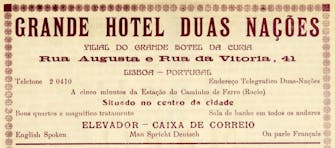It was in the vibrant year of 1879 that the Grande Hotel Duas Nações appeared, on a 1st floor at Rua da Vitória. Its owner was Felizardo da Lima Sertã. In Portugal, the political system was still the Constitutional Monarchy of the Reign of D. Luis I and Partido Regenerador. At the king's initiative, hundreds of kilometers of roads and railways, several bridges were built in the country and steam navigation was ensured in the Tagus, Sado, and between Lisbon and the Azores. In addition, it introduced the electric telegraph in Portugal, created industrial education and organized agricultural education.
A política de desenvolvimento dos transportes e comunicações permitiu aumentar a circulação de produtos e estabelecer um mercado nacional, contribuindo, assim, para a modernização do país.
The policy for the development of transport and communications has increased the circulation of products and established a national market, thus contributing to the modernization of the country.
It is in this context that, in 1907, the Hotel also became the property of José Marques who modernized and remodeled it in such a way that it went from one to five floors in the same original building. The ground floor was occupied by Alfaiataria Ribeiro & Silva.
With 58 rooms, all facing the exterior, it was advertised for its "cold, hot and rainy bathrooms".
All the decoration of the hotel stood out for its simplicity and elegance.
With a dining room with a capacity for 80 people, the service was divided between French and Portuguese hours - lunch at 10 am and 1 pm, and dinner at 5 pm and 8 pm, with French and Portuguese cuisine.
It was literally to the customer's taste.
The Hotel Duas Nações was well known for the convenience it offered to its guests.
It is in 1926 that, in order to make this competence even more valuable, it starts offering a car and car service to facilitate the visits of its guests to the city.
A daily rate at this time cost each guest between 1 $ 300 and 2 $ 500 reis.














